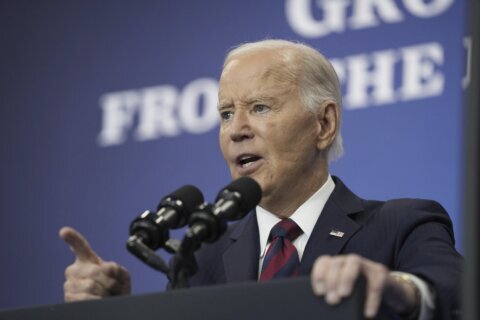ATLANTIC CITY, N.J. (AP) — Betting on the outcome of U.S. Congressional elections can resume, at least temporarily, a federal appeals court ruled Wednesday.
The U.S. Court of Appeals for the District of Columbia Circuit dissolved an order it had previously issued that prevented New York startup company Kalshi from taking bets on which political party would control the House and Senate after this November’s elections.
The ruling clears the way for such betting to resume while the court further considers the underlying issues in the case.
So far, Kalshi has only offered bets on congressional races; it was not immediately clear whether they plan to expand offerings to include the presidential election.
The court said it could reconsider a ban if the commission provides new evidence of serious harm to the public interest in the coming weeks.
Yaakov Roth, an attorney for Kalshi, said the company is now free to resume taking such bets, but did not know if it had already done so.
No such markets were listed on the company’s website as of 2 p.m., and a company spokesperson did not immediately return a message seeking comment. The U.S. Commodity Futures Trading Commission, the government agency trying to prevent such betting, declined comment.
Kalshi is seeking government approval and regulation of political bets.
But the commission denied that approval, saying that such bets are vulnerable to manipulation, and could lessen already fragile confidence in the integrity of American elections.
A federal court last month ruled in favor of Kalshi, which took about $50,000 worth of such bets in the eight hours after the ruling, until the appeals panel issued a freeze on them.
That freeze was melted on Wednesday when the court ruled that the commission did not prove that irreparable harm was likely to result from the resumption of election betting.
Better Markets, a non-profit group advocating for the public interest in financial markets, called it “a sad and ominous day for election integrity in the United States.”
“Gambling on elections will create powerful new incentives for bad actors to interfere with our elections and sway voters outside of the democratic process,” said Stephen Hall, the group’s legal director. “The use of AI, deepfakes and social media to manipulate voters and influence election outcomes has already become all too real. Ready access to an election gambling contract such as Kalshi’s will intensify that danger with the promise of quick profits.”
Hall said that allowing bets this late in the election cycle could open the door to potentially unfixable problems.
“There is no way to undo the potential damage to the public interest of allowing bets in the final weeks of an election year,” he said. “No matter what, we have yet another reason to be concerned about the upcoming elections.”
Likewise, a U.S. senator who has introduced a bill that would ban all elections betting, called the court’s move “a bad bet for our democracy.”
“When we reduce our democracy to a horse race for the ultra-rich and huge corporations to bet on, we demolish the integrity of our democratic process and put corporate profits over people,” said Sen. Jeff Merkley, a Democrat. “Allowing big wagers with the ability to put the thumb on the scale is like allowing bets on ballgames when you also control the umpire. It is corruption, plain and simple. And it is corruption aimed at the heart of our democracy.”
Kalshi offers yes-no bets on a vast array of topics, including whether Netflix will gain a certain amount of subscribers this quarter; how many vehicles Tesla will produce this quarter, and whether singer Chappell Roan will have a No. 1 hit this year.
Amid political topics, the company was taking bets Wednesday on how high President Joe Biden’s approval rating will be by the end of this month; whether the U.S. will ban TikTok by May; and whether there will be a second or even a third presidential debate this year.
___
Follow Wayne Parry on X at www.twitter.com/WayneParryAC
Copyright © 2024 The Associated Press. All rights reserved. This material may not be published, broadcast, written or redistributed.







